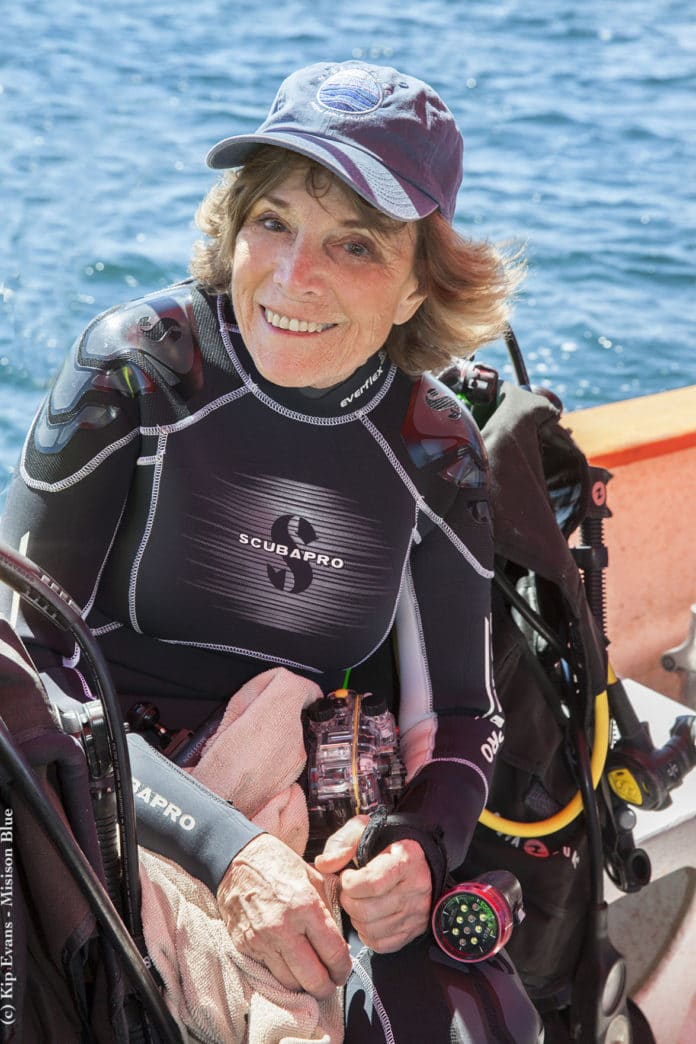Sylvia Earle, who has spent more than 7,000 hours underwater in her career as an oceanographer, will receive the 2018 International Award of Excellence in Conservation from the Botanical Research Institute of Texas Oct. 25.
Earle holds a Ph.D. in botany from Duke University and is the first ocean conservationist to receive BRIT’s conservation award in its 23-year history.
Her 1966 dissertation, “Phaeophyta of Eastern Gulf of Mexico,” shed new light on the region’s aquatic plant life, and when combined with her other Gulf research, the body of work stands today as the definitive study of the region’s abundant and rich aquatic plant life, BRIT said in a news release.
“The study of botany whether on land or in the ocean serves as the fundamental key to solving our planet’s environmental challenges,” Ed Schneider, BRIT’s executive director, said in the news release. “Dr. Earle’s dedication in keeping the ocean blue is truly remarkable. On behalf of the BRIT board, I commend her for her important, ongoing work. We are thrilled to have her among our illustrious Conservation Award honorees.”
Schneider also holds a Ph.D. in botany from the University of California, Santa Barbara.
Earle, now 82, has led more than 100 expeditions. In 1970, she led the first team of women aquanauts on the government’s historic Tektite II deep-sea research project, during which time the team conducted groundbreaking work on the effects of coral reef pollution, the news release said.
She has participated in 10 saturation dives and set the women’s solo diving record at 1,000 meters depth. The New Yorker and the New York Times have called her “Her Deepness,” and the Library of Congress named her a “Living Legend.” She was the first recipient of Time Magazine’s “Hero for the Planet” and the 2009 TED Prize winner.
She will receive the award recognizing her lifetime of work in marine biology and ocean conservation at the BRIT’s annual ceremony at the Worthington Renaissance Fort Worth Hotel.
Earle’s recent research focus is on developing a global network of marine protected areas – called “Hope Spots” – to safeguard the living systems that provide the underpinnings of global processes. Today, she is Explorer-in-Residence at the National Geographic Society and a prolific author and lecturer.
The award comes at a time when clumps of saragassum, a floating ocean weed, is fouling beaches and bays along the Gulf of Mexico and the Caribbean and from the Carolinas to Texas.
A July 21, 2018, report on National Public Radio’s “All Things Considered” program said that a massive bloom is now appearing almost every year in the tropics, threatening both the fishing industry and the tourism industry.
“In Barbados, the government has mobilized the military to aid in the cleanup,” the NPR report said. “On Antigua, large amounts of the seaweed have forced the closing of at least one hotel. In Mexico, Grenada and most other Caribbean destinations, local officials and hotel operators are struggling to clear beaches, often using backhoes and other heavy equipment.”
Hazel Oxenford, a fisheries biologist at the University of the West Indies, said on the program that
an obvious factor is the large amounts of nutrients being dumped into the ocean by farming and development worldwide.
“We’re talking about mass increase in nutrient levels from deforestation in the Amazon, from urbanization in the Congo,” she says. “Plus climate change, particularly an increase in surface water temperatures. Because the two things that plants or this floating seaweed will respond to is an increase in nutrients and an increase in water temperature.”
The BRIT award was created in 1995 to honor individuals and organizations that exemplify the ideals expressed in BRIT’s mission.
Honorees include scientists, conservationists, heads of state, philanthropists, Pulitzer Prize winners, politicians and other notables.
The Botanical Research Institute of Texas is a nonprofit, international research and education organization that collects and safeguards plant specimens, studies and protects living plants, and teaches about the importance of conservation and biodiversity to the world.
For tickets to the event: bit.ly/BRIT2018
For more information about BRIT: brit.org
– FWBP Staff






